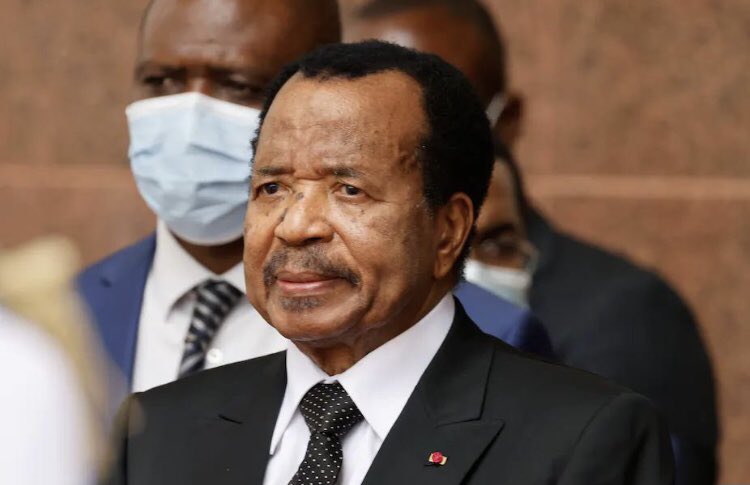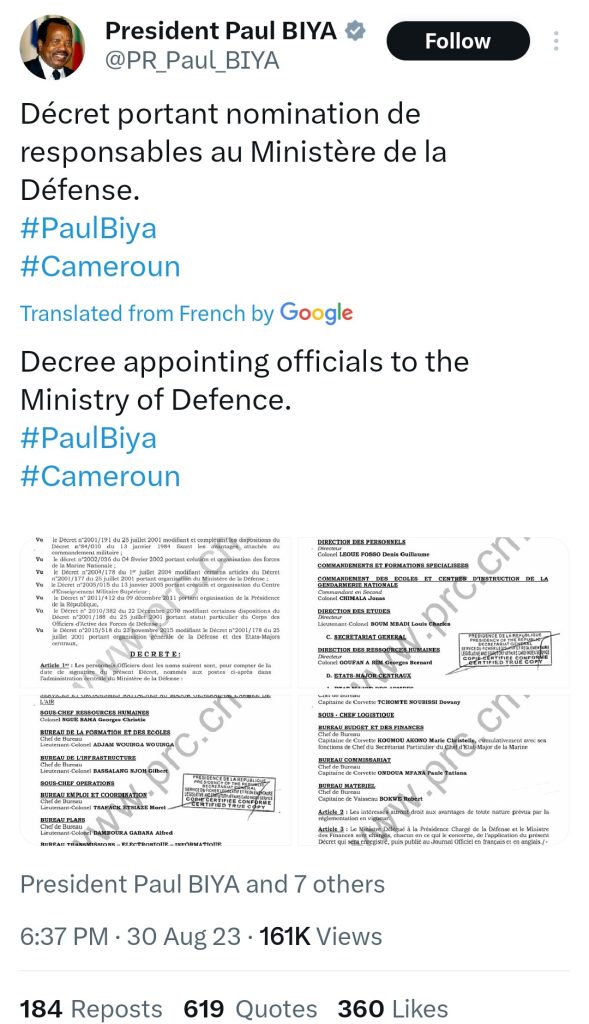Cameroun’s Biya hurriedly reshuffles defence command, amid coup fears

![]()
President of Cameroun, Mr Paul Biya, has reshuffled the high command at the Defence ministry, in the wake of the coup which occurred in the neighbouring Central African nation of Gabon, early Wednesday, which ousted Ali Bongo Ondimba.

The now 90-year-old Mr Biya has ruled Cameroun for over five decades in power was said to have announced sweeping changes to the military high command, Wednesday evening to avert a possible overthrow of his government by soldiers.
Biya announced significant changes in the central administrative unit at the Ministry of Defence, as he appointed key personnel at the internal and external services of the Ministry.
In a decree dated August 30th, 2023, Biya appointed new staff members at the Ministry of Defence’s central administrative division.
He also issued a series of decrees, appointing the Rector of the University of Ngaoundere, officials in some Universities, and another transforming the Consulate of the Republic of Cameroon at Ouesso, Republic of Congo, into a General Consulate.
Biya who has been Cameroon’s President since 1982, was previously the country’s the Prime Minister from 1975 to 1982.
Biya who is Africa’s second-longest serving leader, will complete his mandate in 2025. However, some Camerounians are still urging him to seek an eighth term in office.
Cameroun has been engaged in a civil unrest arising demand for secession by the English-speaking Southern region, Ambazonia in their call for self-determination.
Meanwhile, the military officer believed to have led the coup in neighbouring Gabon, on Wednesday, General Brice Oligui Nguema has dismissed report claiming he is now the new leader of the country.
“I do not yet declare myself as the head of the Gabonese state. I do not envision anything at the moment. This is a debate we are going to have with all the generals.
“Let’s meet again at 14:00 GMT (Thursday). It’s all about clearing a consensus. Everyone will submit ideas and the best ones will be chosen, along with the name of the one who will lead the transition,” Gen Nguema said.

If a coup does take place in Cameroun, it would mean all three neighbouring countries surrounding Nigeria now have military rulers; including Chad and Niger Republics, with the exception of Benin Republic, all in West Africa alone.
It would be recalled that neighbouring Gabon had witnessed a coup on Wednesday by soldiers who rejected and invalidated the recently conducted general elections that had returned incumbent president, Ali Bongo Ondimba in office after four decades of his family ruling the country.
The Gabon coup follows the yet-to-resolved July 26 Niger coup in West Africa.
Army officers in Gabon had confirmed, Wednesday, that the ousted civilian president, Ali Bongo is under house arrest.
This is also as the deposed president, Wednesday, dispatched a broadcast message via the internet to Gabonese urging them to make ‘noise’ against the coup plotters.
The officers announced their coup early Wednesday morning on national television channel Gabon 24, just moments after the nation’s election commission had announced that Bongo had won a third term in Saturday’s general elections.
The officers said that the election results were invalidated, all state institutions dissolved and all borders closed until further notice.
“We have decided to defend the peace by putting an end to the current regime,” one of the officers said.
Hours after the initial announcement, the officers released another video claiming they had detained Bongo.
Bongo first took office in 2009, after the death of his father, Omar Bongo who had become president of the oil-rich nation in 1967.
The Central African nation has a population estimated to be 2.4 million people but with nearly half of it impoverished.
Saturday’s elections were overshadowed by a lack of international observers, raising concerns about transparency.
Afterwards Bongo’s government curtailed internet service and imposed a nightly curfew across the nation, saying it was necessary to prevent the spread of misinformation.
Gunfire was heard throughout Gabon’s capital, Libreville, after the officers’ initial television appearance.
Residents later poured onto the streets of Libreville to celebrate news of Bongo’s removal.
The declared coup comes on the heels of last month’s military overthrow of President Mohamed Bazoum of Niger, the latest in a series of coups across West and Central Africa since 2020.
President Bongo survived an attempted military takeover in January 2019 as he was recovering from a stroke.
Many observers have readily condemned the message reportedly broadcast by the deposed the leader via the internet calling on Gabonese to resists and make ‘noise’ against the military coup plotters.
According to the commentaries monitored by Oracle Today newspapers, the popular opinion is that the deposed leader deserved what he is getting.
“He shut down the internet in the wake of the rigged elections depriving Gabonese the opportunity to exercise their civil rights of voting, and he is using the same internet to appeal to them to come to his rescue. African leaders and their madness,” they wrote in some of the opinions expressed via Twitter (now X), Wednesday.


